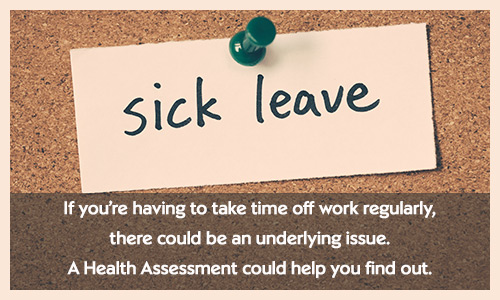10 signs that you’re stressed
We all experience stress at times and there are many triggers. Stress can be rooted in work, social, financial, health or lifestyle issues, or a combination of all of these. Becoming a parent, moving house, starting a new job or taking on new responsibilities, for example, can all be stressful experiences.
Stress for a short period of time isn’t a problem, but if left unchecked it can affect your life and your wellbeing significantly. However, people often don’t realise that they are stressed, seeing the symptoms in isolation instead.
Being able to identify that you are stressed will allow you to address the causes, and get back to a healthier and happier you. So here are 10 tell-tale signs. If you are experiencing any of them it's time to take action:
1. Feeling tired

Stress has a physiological effect on your body by releasing hormones into your bloodstream which accelerate your heart rate and your breathing. This constant strain on your system can have an exhausting effect, leaving you feeling tired all the time.
In a cruel twist, stress can also prevent you from sleeping. Stress has been found to activate the hypothalamo-pituitary-adrenal axis in the brain, which plays a part in sleep-wake regulation. You may experience sleep loss and find that you are constantly going over the same issue in your head again and again. This is your brain working overtime to try to find a solution.
2. Teeth grinding
Teeth grinding is a symptom of stress closely linked to a lack of sleep, because your subconscious has heightened activity and this plays out in your mouth. Grinding your teeth can cause dental problems and also a painful jaw which can add to your suffering.
3. Headaches
Sometimes known as stress headaches, tension headaches are known to be brought on by stress. Lasting anything from half an hour to a few hours these headaches feel like pressure on either side of the head and can also be accompanied by tense neck and shoulders. If you suffer these headaches regularly, it’s very possible that you are suffering from stress.
4. You're feeling irritable
Stress can affect our mood in ways that we find difficult to control. When we are stressed our nervous system is hyper-responsive and our sensory receptors are more sensitive to stimuli, making everything seem more intense. This can add to the feeling of perceived pressure, and make us more reactive.
Often if you’re stressed some of the physiological side effects, such as a lack of sleep or a sore head, can also contribute to the effect on your mood.
5. Getting more tearful than usual
For some, these emotional responses can lead to tears, as well as or instead of irritability. But tears are not just an effect of stress, they have a function in supporting you through stress too. When you cry you release excess stress hormones such as cortisol in your tears, like a safety valve. So feeling better after a good cry isn’t a myth - it’s down to the hormonal release.
6. A loss of libido
In order for your libido (sexual desire) to function properly, your hormone balance and neurological pathways need to be in sync. When you are stressed, you release stress hormones, which interfere with this balance and can lead to a loss of libido.
7. Eating too much, too little, or unhealthily

It’s common for people who are stressed to have a poor diet, or to overeat. One factor is that stressed people will often be short on time, and resort to unhealthy fast foods.
People who are in a stressed state in the short term may lose their appetite, this is because part of the brain called the hypothalamus produces a corticotropin-releasing hormone, which suppresses appetite.
But people who are chronically stressed (for a long period of time) release cortisol, which increases your appetite, especially for sweet and starchy foods. This is where the term ‘stress eating’ comes from.
8. Becoming less social
Everybody has times in their life when they just want to relax in peace on their own, but when this becomes too common it may be an indication that you are stressed.
When everything feels like it’s getting too much, it’s a natural inclination to hide away, particularly if the stressor that you are reacting to is social. But social withdrawal will usually have a negative effect on your life, which can make things worse all round.
9. Getting sick easily
Stress has some very real effects on our overall health by suppressing the immune system. This is because when we are stressed we release cortisol into our bloodstream and when cortisol is released, the immune-supporting hormone DHEA can’t be released at the same time, so our immune system suffers.
So, if you find you’re catching colds very easily, or can’t shake them off, it may be because you have a reduced immune system, which can be a result of stress.
10. Feeling panicked
The chemicals released into your bloodstream when you experience stress increase your heart rate, as well as the speed of your breathing. This can be quite distressing and, if severe can lead to feelings of panic including what are known as panic attacks.
You might feel shortness of breath or start to panic as you hyperventilate. Hyperventilation is very closely linked to anxiety, and can usually be resolved by removing yourself from the situation and actively trying to slow your breathing.
Any of these symptoms can be linked to stress, and if you’re experiencing them you shouldn’t suffer in silence. Speak to a healthcare professional who will be able to advise on a course of action to reduce your stress levels, and get you back to good health.
If you’re having suicidal or very distressing thoughts, and you’re worried you might act on them, call your GP or NHS 111 as soon as possible. To speak to someone about how you’re feeling, call The Samaritans on 116 123.
Last updated Thursday 23 January 2025
First published on Tuesday 14 June 2016


